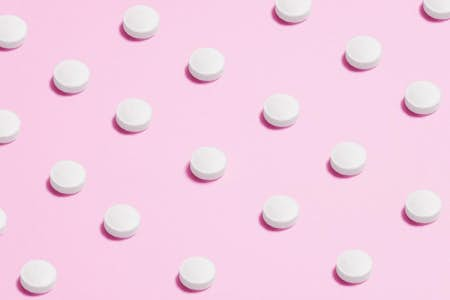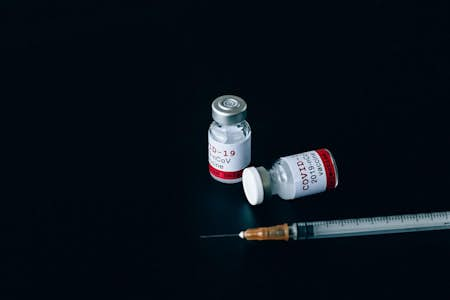Nutrition and lifestyle changes can help you thrive during the menopause and beyond, but what exactly is the menopause diet?
What is the menopause diet?
There may be diets called "the menopause diet," but there is not currently a specific diet for the menopause. However, there are some foods you may want to avoid during menopause.
Some foods can help you mitigate some of the side effects of menopause, and there are diet and lifestyle changes that you should consider. However, no diet magically cures any symptoms you may be experiencing during menopause.
Use this guide to help you navigate your way through this period of your life, focusing on nutrition and lifestyle factors that can improve or worsen your situation.
What is the menopause?
Menopause is when a woman’s periods stop, and they are no longer able to bear children. It occurs due to the ovaries slowing down their production of oestrogen. Menopause often occurs between the ages of 49 and 52.
Before the menopause, a woman’s oestrogen levels can actually increase; this period is known as perimenopause and can lead to hot flushes, mood swings, difficulty sleeping, and other conditions associated with menopause.
When people talk of "the menopause," they are really talking about perimenopause, which literally means “around the menopause.” The menopause itself refers to the period when menstrual cycles stop forever.
How does menopause affect weight gain?
Many women notice that going through menopause causes them to gain weight, with the average weight gain 4 - 6kg. Some women experience much higher weight gain, while others experience much less.
Why is that? As easy as it would be to say “genetics” and shrug our shoulders, we’re not going to be that dismissive!
The truth is that the menopause itself doesn’t cause weight gain. The fact that women tend to gain weight around their late 40s and early 50s is less to do with the menopause and more to do with lifestyle changes that affect both men and women at that age.
Weight management is all about how many calories you consume and how many calories you burn. While the menopause can affect your metabolism, the most significant cause of weight gain during menopause is a reduction in activity.
People move less as they age, often contributing to a loss of muscle mass, which affects your metabolism.
If your metabolism slows due to less exercise, then the same diet you were following before could now lead to weight gain!
However, the menopause certainly makes life more difficult. One big issue with the menopause is the effect it can have on sleep. Lousy sleep has been shown to affect appetite, reduce daily activity, and lead to weight gain. Studies have shown there is a link between sleep loss and increased risk of obesity.
What foods should I avoid during menopause?
There aren’t any foods that can worsen the symptoms of menopause significantly, though caffeine and alcohol may worsen hot flushes. Still, not all women will get hot flushes. If you don't, then caffeine and alcohol should not make much difference provided you stick to guideline intakes.
What foods help with menopausal belly fat?
No food will specifically help you to burn body fat. That’s not how food works. Removing body fat is all about creating a calorie deficit, where you consume fewer calories than you burn. To create that calorie deficit, you can burn more calories (exercise) and consume fewer calories (diet). Foods that are good for diets are:
- High in protein
- Fruit and vegetables
- High in fibre
- Aren’t highly processed
If you can base your diet around such foods, you will find it easier to create a calorie deficit and ultimately say goodbye to menopausal belly fat.
Can certain foods help with menopause?
According to the Association of UK Dieticians, there are three ways in which your diet can help with menopause:
- Increasing your calcium intake can help prevent osteoporosis.
- Increasing your omega-3 intake, fibre, and fruit and vegetables can protect your heart.
- Eating foods that contain phytoestrogens can help to lessen some symptoms of menopause.
Increasing calcium intake
Even before menopause, women will start to lose calcium from their bones, increasing their risk of fractures. Increasing your calcium intake is a smart move. Dairy is an obvious source of calcium, but it is by no means the only one. Here are some examples of non-dairy foods that contain calcium:
- Broccoli
- Kale
- Oranges
- Canned salmon and sardines
- Beans
Protecting the heart
Many foods can help to protect your heart during menopause. Upping your omega-3 intake is a smart move, as is doing the same for sources of dietary fibre. Both can help to protect your heart. Increasing your fruit and vegetables can also go a long way.
Phytoestrogens
Phytoestrogens work in a similar way to oestrogen in the body, so increasing your phytoestrogens can mitigate the effects of menopause slightly. It’s not going to make an enormous difference but may help a little. Foods that contain phytoestrogens have many other health properties, so increasing consumption is a smart move.
Here are some foods that contain phytoestrogens, courtesy of the NHS website:
- Seeds
- Tofu
- Soya milk
- Soya flour
Ailsa Hichens, Registered Nutritional Therapist & Health Coach at Food Fabulous, agreed, telling Health Times: "Since perimenopause and menopause are about declining natural levels of oestrogen, what can really make a difference is bringing in phytoestrogens. These are plant sources of oestrogen, and they exert a very weak, oestrogen-like effect. It’s not as potent as hormone treatment, and this makes it suitable for everyone. One important thing to know about these foods is that they are adaptogens, which means they give or remove oestrogen. You will only get what your body needs.
"You’ll find phytoestrogens in lots of foods, but the most potent sources are soy products (like tofu, miso, and tempeh - find all of them in the chilled vegan section of supermarkets) and flaxseeds, which you can very easily add to porridge or overnight oats, smoothies, sprinkle on yoghurts or even salads."
How to lose weight during or after menopause
The idea that because you are going through menopause you can only gain weight is inaccurate. As we mentioned earlier, while menopause can make weight gain more likely due to affecting sleep and mood, it doesn’t mean that weight gain is likely.
You can avoid weight gain and even lose weight by making changes to your lifestyle. Check out our article on starting an exercise habit at an older age to find ways in which you can disrupt the supposedly inevitable.
Increasing your daily activity, signing up to a gym or exercise class, going for long walks or hikes, and counting your steps are all proven ways to increase your metabolism and help to create a calorie deficit.
Making changes to your diet is also a smart move. As we saw above, there aren't foods that can specifically cause fat loss. However, adding higher protein foods, more fibre, and more fruit and vegetables to your diet can help you consume fewer calories each day. This can then lead to weight loss, particularly when combined with increased daily activity.
Why mindset is important
The menopause can cause a lot of emotional turmoil, with mood affected and anxiety and stress more likely. This is partly due to hormonal fluctuations but is also likely to be affected by lousy sleep and weight gain.
So far, we’ve focused on diet and exercise, but finding ways to deal with stress and anxiety can be just as valuable, perhaps even more so.
The NHS website recommends Cognitive Behavioural Therapy (CBT), which is supposed to be very effective for anxiety. Following a nutritious diet, exercising regularly, and looking at ways to improve sleep quality can also contribute to better mood and less anxiety. But talking to a health professional is undoubtedly a good idea if symptoms of anxiety, stress, and depression persist.
Exercising during menopause
In the previous two sections, we have looked at the importance of exercise for physical and mental health. But what type of exercise should you be doing?
Many women tend to avoid the weights area of most gyms, but this could well be the best place for them to go. Lifting weights or using resistance machines is a great way to improve bone health, strengthen muscles, and prevent muscle loss, which can affect your metabolism.
Lifting weights is also excellent at improving heart health as it is a cardiovascular exercise. Of course, traditional cardiovascular activities like walking, jogging, and running are also good for weight management and helping with mental health.
Taking up a sport or joining an exercise class is also a great way to combine healthy exercise with the mood-enhancing benefits of socialising with others. Golf is a very popular sport for this very reason, but you may want to also look at some more physically taxing sports such as tennis or other racket sports.
Increasing your daily activity can also come in other forms. Walking the dog, gardening, home improvements, washing the car, building a shed; whatever the activity, it can help increase your daily exercise and burn more calories.
What is the menopause diet?
The menopause can be a tricky time, and the effect that it can have on your mood and mental health has too often been overlooked. Yes, we've primarily focused on the weight management aspects, but it really is a lifestyle issue.
Luckily, as is always the case, you have complete control over your own destiny. Provided you maintain an active life and eat a healthy and nutritious diet, you should see little difference on the scales or in the mirror.
Eating more fruit and vegetables may seem like small potatoes, but doing so can make a massive difference in the long term.









